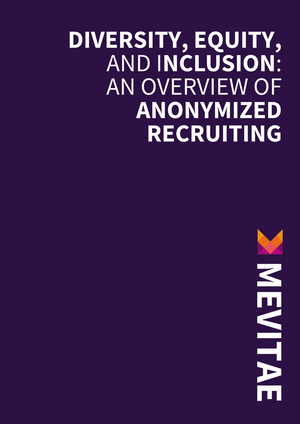Diversity, equity and inclusion: An overview of anonymised recruiting

With 95% of human decisions being subconscious, cognitive biases often factor into our decision-making, and the hiring process is no exception. This can, in part, be attributed to the mental shortcuts (heuristics) that the human brains take when processing information quickly and this is particularly acute during the longlisting phase, where recruiters are required to produce a large number of high-quality decisions.
A promising approach for tackling this is resume/CV anonymisation, where potentially biasing information is redacted from CVs, cover letters and any supporting document before the longlisting phase. Over the last five years, the use of anonymous hiring policies has skyrocketed, and now many global organisations, such as Deloitte, HSBC, and KPMG have some sort of anonymisation during the hiring process. In this report, MeVitae discusses diversity, equity and inclusion, cognitive biases, and CV/resume anonymisation in detail, and review the scientific literature on anonymisation processes, concluding that there is tentative evidence to suggest its efficacy in improving the diversity of workplace hires.
Hiring bias starts from the initial screening stage where, often because of time restrictions, recruiters and hiring managers are drawn to information on an application form that helps characterise the candidate. By redacting different parameters, anonymous recruiting removes information that does not predict performance, with the intention of eradicating prejudice during the screening stage.
Importantly, anonymous recruiting has not been designed to replace tools like bias training or mentoring programs, nor has it been designed to guarantee certain groups of candidates’ jobs. Anonymous recruiting aims to reduce bias, making the hiring process as fair as possible regardless of who receives the job offer. Solutions like mentoring programs and job specification analysers help attract a more diverse range of candidates to certain positions but in terms of reducing bias from the hiring process, anonymous recruiting is the best solution in the market.

